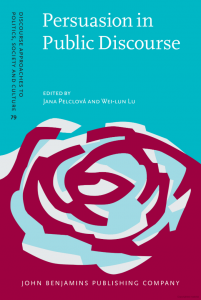Persuasion in Public Discourse: Cognitive and Functional Perspectives, was published last September in John Benjamins Publishing Company’s prominent series “Discourse Approaches to Politics, Society and Culture”, Volume 79. The editors are Jana Pelclová and Louis Wei-lun Lu, form the Masaryk University in Brno, Czech Republic.
As the title suggests, the book proposes a multidisciplinary contribution to the study of persuasion from different approaches: Part I and II start by accounting for a historical perspective of the phenomenon to advance towards the persuasive strategies used in contemporary political and socio-ecological messages. Parts III and IV cover the highly influential media discourse, and the persuasive effects of commercial language. Academic discourse is also dealt with in Part V, and may be of interest to whoever that operates in the academia. Multimodality in public discourse is also dealt with in the last chapters, Part VI, where visuals and music are part of the persuasive message.
Gonzalo Calle Rosingana, member of University of Vic’s Research Group Learning and Communication (GRAC) is the author of chapter 4, in Part II of this book, with the title “Fictionalising scenarios in political discourse: Catalan self-determination”. The chapter deals with political discourse and makes a qualitative study of the investiture speech Artur Mas gave in December 2012, when he was re-elected president. Calle focusses on the organization of information of the speech event, the way attention patterns and focal adjustment work, and how these combine with first-person plural pronouns, adjectives, and verb endings. A crucial aspect in the analysis is the role of deontic modal verbs that, after minimizing the deontic force, engage the audience in covert imaginary worlds that project a promising future. The analysis involves the implementation of G. Fauconnier’s mental space theory, the concepts of R. Langacker’s nominal and verbal grounding and evaluating the role of deontic modal verbs taking P. Chilton’s deictic space theory.
A must read for those interested in discourse analysis, and political discourse.

